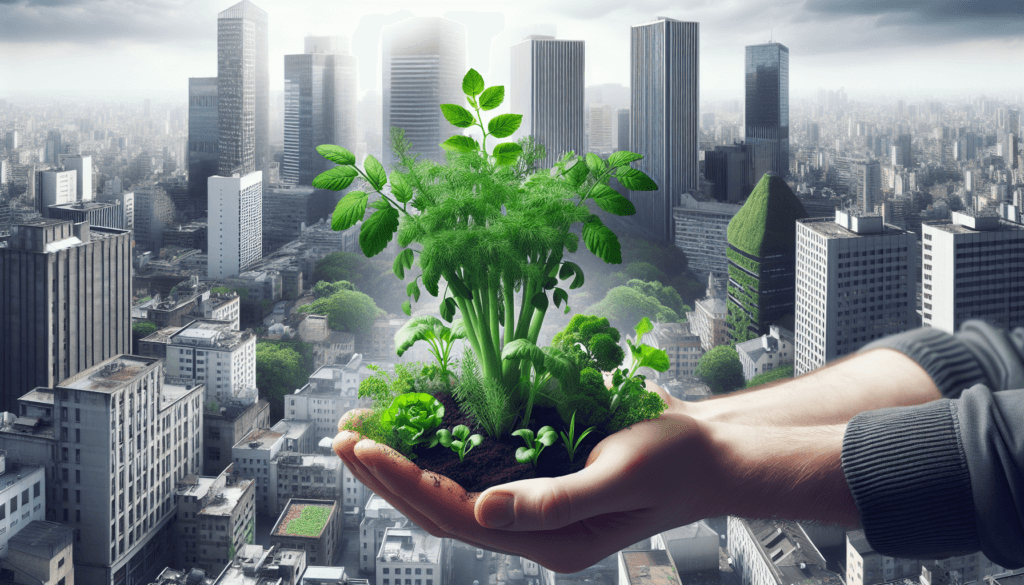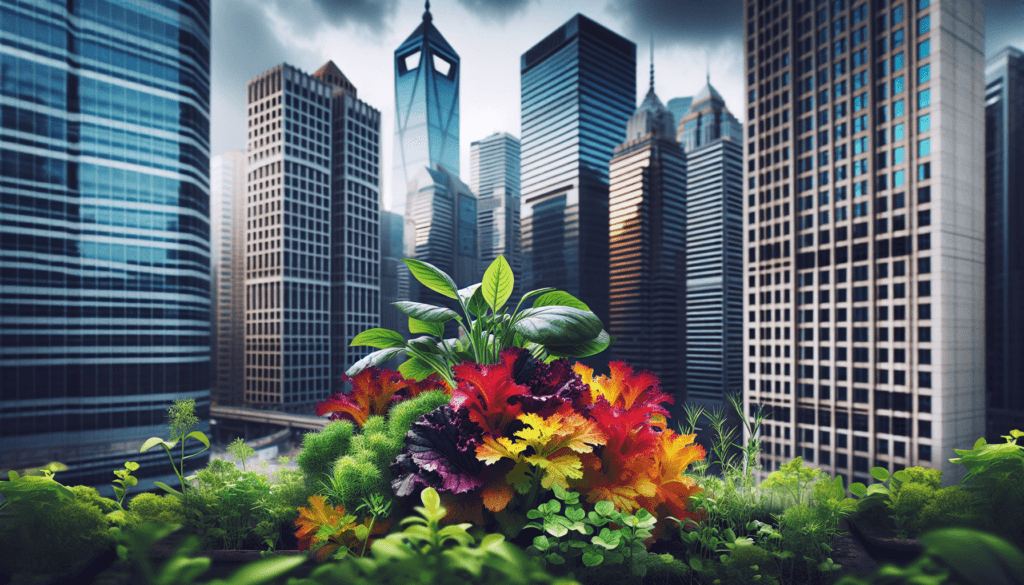Imagine strolling down a bustling city street, surrounded by towering buildings and the hum of urban life. Amidst this concrete jungle, you notice something unexpected and utterly captivating – a vibrant, flourishing garden. Instantly, you’re filled with curiosity, wondering why people choose to cultivate these oases amidst the chaos of city living. What drives individuals to take on the rewarding yet challenging task of growing gardens in the heart of the urban landscape? As you will soon discover, the reasons are as diverse as the plants themselves.
Access to Fresh and Healthy Food
Benefits of Growing your own Food
Growing your own food in the city provides many benefits, especially when it comes to accessing fresh and healthy food. With urban gardens, you have the ability to grow a wide variety of fruits, vegetables, and herbs right at your doorstep. This means you can have immediate access to the freshest produce possible, without the need to rely on grocery stores or farmers’ markets.
By growing your own food, you have control over what goes into your plants, allowing you to make healthier choices. You can choose to use organic methods and avoid harmful pesticides, ensuring that your food is as healthy and natural as possible. This can have a positive impact on your overall health and well-being.
Overcoming Food Deserts
Urban gardens also play a crucial role in addressing the issue of food deserts in some city neighborhoods. Food deserts are areas where there is limited or no access to affordable and nutritious food. By growing your own food, you can help combat this problem by providing yourself and others in your community with fresh, affordable, and nutritious options. Urban gardens can be a lifeline for those who struggle to find fresh produce within their immediate vicinity.
Promoting Sustainable Practices
Conservation of Resources
Urban gardening promotes sustainable practices by conserving resources such as water and energy. By implementing efficient watering systems such as drip irrigation or rainwater harvesting, you can drastically reduce water consumption compared to traditional agriculture methods. Additionally, urban gardens often make use of small spaces, reducing the amount of land needed for food production.
Recycling and Composting
Another way urban gardening promotes sustainability is through recycling and composting. By composting kitchen scraps and yard waste, you can create nutrient-rich soil amendments that help improve plant growth and reduce the need for chemical fertilizers. Recycling materials like plastic containers or old tires for planting containers not only helps reduce waste but also gives them a new purpose in your garden.

Utilizing Small Spaces
Vertical Gardening
One of the challenges of urban gardening is limited space. However, creative solutions exist to maximize productivity in small areas. Vertical gardening, for example, allows you to grow plants upwards by using trellises, hanging baskets, or vertical planters. This method takes advantage of the vertical space available, allowing you to grow a variety of crops without needing a large ground area.
Container Gardening
Container gardening is another effective way of utilizing small spaces. By using pots, planters, or even repurposed containers like buckets or old barrels, you can grow plants even in the tiniest of spaces like balconies or rooftops. Container gardening offers flexibility since you can move the pots around to optimize sunlight exposure or adjust for changing weather conditions. It also makes gardening more accessible to those with physical limitations or mobility issues.
Connecting with Nature
Therapeutic Benefits
Urban gardening provides a way to connect with nature, even in the midst of a bustling city. Spending time outdoors, working with plants, and engaging in the natural processes of growth and development can have a calming and therapeutic effect on the mind and body. Gardening can help reduce stress, lower blood pressure, and improve overall mental well-being.
Creating Habitat for Wildlife
Urban gardens not only benefit humans but also provide essential habitats for wildlife, particularly in areas where green spaces are limited. By planting native plants and incorporating features like bird feeders or pollinator-friendly flowers, you can attract a diverse range of birds, bees, butterflies, and other beneficial insects. This promotes biodiversity and helps create a mini-ecosystem within your urban environment.

Improving Mental Health
Stress Relief
In the fast-paced urban environment, stress is a common issue. Urban gardening offers a natural antidote to stress by providing an escape and a chance to focus on a soothing and rewarding activity outside of the demands of daily life. The act of tending to plants, nurturing their growth, and witnessing the vibrant colors and fragrances they produce can have a calming effect, reducing anxiety and improving mental well-being.
Sense of Accomplishment
Growing your own food or creating a beautiful garden in the city can also provide a sense of accomplishment. Seeing the fruits of your labor, quite literally, can boost self-esteem and provide a sense of pride and satisfaction. This can be especially meaningful for individuals who may not have access to outdoor spaces or traditional gardening opportunities.
Community Building
Shared Spaces and Collaboration
Urban gardens serve as communal spaces that bring people together, fostering a sense of community and social connection. Whether it’s a community garden, a shared rooftop garden, or even a simple roadside plot, these spaces create opportunities for neighbors to interact, share knowledge, and collaborate. Working side by side with others towards a common goal can strengthen relationships and create a sense of belonging.
Food Sharing and Exchange
Urban gardens also encourage food sharing and exchange within the community. Surplus produce can be shared with neighbors or donated to local food banks, ensuring that everyone has access to fresh and healthy food. Engaging in such acts of generosity not only helps build stronger communities but also promotes a culture of sharing and caring.

Educational Opportunities
Hands-On Learning
Urban gardens provide unique educational opportunities, especially for children and young adults. Engaging in hands-on gardening activities allows them to learn about plant life cycles, environmental stewardship, and sustainable practices. These gardens can serve as outdoor classrooms, teaching valuable lessons about biology, ecology, and the importance of food production.
Nutrition and Healthy Eating
Additionally, urban gardens can be used as a platform to educate the community about nutrition and healthy eating. Workshops, cooking demonstrations, and tastings can be organized to teach individuals how to incorporate fresh produce into their diets and make nutritious meals. By empowering people with knowledge, urban gardens can contribute to a healthier and more informed community.
Reducing Food Miles and Carbon Footprint
Environmental Impact of Food Transportation
The transportation of food from farms to urban areas contributes to the carbon footprint of the food system. Long-distance transport leads to greenhouse gas emissions and consumes large amounts of fuel. By growing food within the city, the distance traveled by produce is significantly reduced, resulting in a significant reduction in carbon emissions.
Localizing Food Production
Urban gardens contribute to localizing food production, minimizing the need for long-distance transportation and reducing the environmental impact. When food is grown locally, it cuts down on the use of fossil fuels, conserves energy, and supports a more sustainable food system. By consuming locally produced food, individuals can actively participate in the global effort to mitigate climate change.

Ensuring Food Security
Food Resilience and Self-Sufficiency
Urban gardening plays a vital role in ensuring food security in cities. By growing your own food, you become less reliant on external food sources, ensuring a consistent supply of fresh produce. This resilience and self-sufficiency become particularly crucial during times of crisis or disruptions, such as natural disasters or supply chain interruptions.
Accessible Food Production
Urban gardening also increases accessibility to food production for individuals who may face barriers to food security, such as limited financial resources or physical disabilities. By providing an opportunity to grow their own food, urban gardens empower individuals and communities to take control of their food supply and reduce the risk of food insecurity.
Beautification and Aesthetics
Transforming Urban Spaces
Urban gardens have the power to beautify and transform otherwise empty or neglected spaces within the city. Rooftops, abandoned lots, or barren sidewalks can be turned into lush green oases, blooming with color and life. These gardens not only enhance the aesthetics of the urban environment but also improve the overall quality of life for residents.
Enhancing Public Spaces
Beyond personal gardens, urban gardens can also enhance public spaces, such as parks or community gathering areas. Incorporating plants and greenery into these spaces creates a more inviting atmosphere, encouraging people to spend more time outdoors and fostering a stronger sense of community. These green spaces can become focal points within the city, attracting both residents and visitors alike.
In conclusion, urban gardening offers numerous benefits to individuals, communities, and the environment. Access to fresh and healthy food, promoting sustainable practices, utilizing small spaces effectively, connecting with nature, improving mental health, fostering community building, providing educational opportunities, reducing carbon footprint, ensuring food security, and enhancing the aesthetics of urban areas are all significant advantages of cultivating gardens in the city. By embracing urban gardening, we can create healthier, more sustainable, and vibrant urban environments for everyone. So, why not start your own urban garden today and experience the joy and rewards it brings? Happy gardening!



